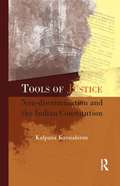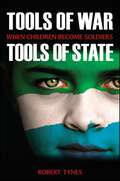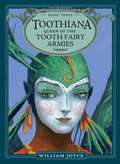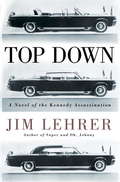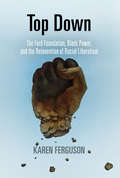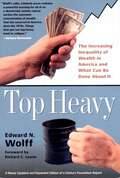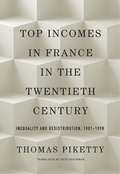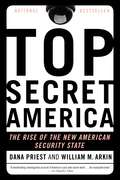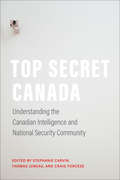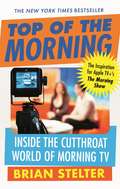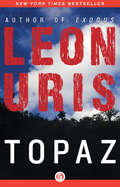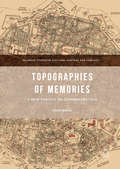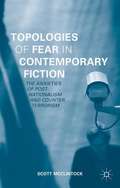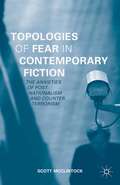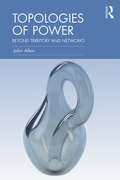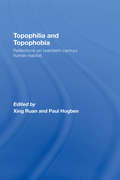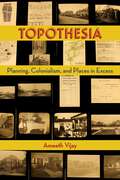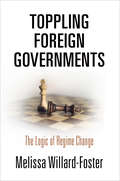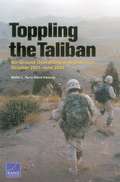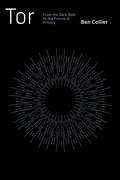- Table View
- List View
Tools of Justice: Non-discrimination and the Indian Constitution
by Kalpana KannabiranIn the years since independence, the Indian subcontinent has witnessed an alarming rise in violence against marginalized communities, with an increasing number of groups pushed to the margins of the democratic order. Against this background of violence, injustice and the abuse of rights, this book explores the critical, ‘insurgent’ possibilities of constitutionalism as a means of revitalising the concepts of non-discrimination and liberty, and of reimagining democratic citizenship. The book argues that the breaking down of discrimination in constitutional interpretation and the narrowing of the field of liberty in law deepen discriminatory ideologies and practices. Instead, it offers an intersectional approach to jurisprudence as a means of enabling the law to address the problem of discrimination along multiple, intersecting axes. The argument is developed in the context of the various grounds of discrimination mentioned in the constitution — caste, tribe, religious minorities, women, sexual minorities, and disability. The study draws on a rich body of materials, including official reports, case law and historical records, and uses insights from social theory, anthropology, literary and historical studies and constitutional jurisprudence to offer a new reading of non-discrimination. This book will be useful to those interested in law, sociology, gender studies, politics, constitutionalism, disability studies, human rights, social exclusion, etc.
Tools of War, Tools of State: When Children Become Soldiers (SUNY series, James N. Rosenau series in Global Politics)
by Robert TynesDespite the supposed taboo against the practice, many governments, rebels, and terrorist groups use children in war to spy and kill. In Tools of War, Tools of State, Robert Tynes examines this complex problem, demonstrating that the modern use of children in war is a tactical innovation. He discusses how boys and girls on the battlefield bolster troop size, create moral dilemmas, and deepen the level of fear. He also reveals how the practice has become an essential component for groups such as ISIS and al-Shabaab, in their state-making projects. Using statistical methods to analyze conflicts from 1987 to 2007, Tynes shows how widespread child soldier use is and confirms the theory that it is tactically advantageous. Through historical analysis, he explains how child soldiering developed out of Mao's protracted war theory and the militarization of youth during the twentieth century. A case study of the civil war in Sierra Leone, which details the brutality involved when children are forced to fight, is included.
Toothiana, Queen of the Tooth Fairy Armies: Nicholas St. North And The Battle Of The Nightmare King; E. Aster Bunnymund And The Warrior Eggs At The Earth's Core!; Toothiana, Queen Of The Tooth Fairy Armies (The Guardians #3)
by William JoyceBeware a tooth fairy queen scorned in this, the third chapter book of Academy Award winner William Joyce&’s The Guardians series. There&’s a lot more to this tooth-swiping sprite than meets the eye!When last we heard, the Guardians were resting easy with the knowledge that the children of Santoff Clausen were finally safe from Pitch&’s dastardly plans. But is it all a ruse, a scheme, a lull the evil Nightmare King has deviously concocted? Whatever Pitch&’s plans, what he doesn&’t know is that there&’s a new Guardian in town, and she&’s not the type to forget old grudges. Actually, she&’s not the type to forget anything—because this Guardian is none other than Toothiana, the Tooth Fairy herself. She&’s fierce and fast and crossing her will lead to a multitude of troubles. And, it turns out that, well, all those teeth she has been collecting? They contain memories. The forgotten memories of childhood…including the memories of how to fly. Young Katherine is hopeful that these memories might help her to remember her parents. The Guardians hope they&’ll offer even further protection from Pitch. You can see how this information would be invaluable to our heroes. But it could also be invaluable to Pitch…
Top Down
by Jim LehrerIn a riveting novel rooted in one of American history's great "what ifs," Jim Lehrer tells the story of two men haunted by the events leading up to John F. Kennedy's assassination. November 22, 1963. As Air Force One touches down in Dallas, ambitious young newspaper reporter Jack Gilmore races to get the scoop on preparations for President Kennedy's motorcade. Will the bubble top on the presidential limousine be up or down? Down, according to veteran Secret Service agent Van Walters. The decision to leave the top down and expose JFK to fire from above will weigh on Van's conscience for decades. But will it also change the course of history? Five years after the assassination, Jack gets an anguished phone call from Van's daughter Marti. Van Walters is ravaged by guilt, so convinced that his actions led to JFK's death that he has lost the will to live. In a desperate bid to deliver her father from his demons, Marti enlists Jack's help in a risky reenactment designed to prove once and for all what would have happened had the bubble top stayed in place on that grim November day. For Jack, it's a chance to break a once-in-a-lifetime story that could make his career. But for Van the stakes are even higher. The outcome of a ballistics test conducted on the grounds of a secluded estate in upstate New York might just save his life--or push him over the edge. A page-turning historical novel with the beating heart of a thriller, Top Down could only have sprung from the fertile imagination of Jim Lehrer. Drawing on his own experience as an eyewitness to the events described, one of America's most respected journalists has crafted an engrossing story out of the emotional aftershocks of a national tragedy. PRAISE FOR JIM LEHRER Super "Sheer delights . . . combines the rolling suspense of Murder on the Orient Express with the high jinks of [Lehrer's] lighter novels."--The Kansas City Star Oh, Johnny "A warmhearted evocation of the road not taken."--Kirkus Reviews Eureka "A nutty, likable romp [that] quickly takes on a deeper resonance that is certain to please readers . . . quite moving."--The Washington Post The Phony Marine "A story of emotional depth and unexpected twists of plot . . . [Lehrer] delivers a convincing and compelling story."--The Oklahoman The Franklin Affair "A serious-minded yet breezy detective story . . . perfectly suited to beach reading and deep enough to raise lasting questions about life, liberty and the pursuit of historical accuracy."--The Miami Herald
Top Down
by Karen FergusonAt first glance, the Ford Foundation and the black power movement would make an unlikely partnership. After the Second World War, the renowned Foundation was the largest philanthropic organization in the United States and was dedicated to projects of liberal reform. Black power ideology, which promoted self-determination over color-blind assimilation, was often characterized as radical and divisive. But Foundation president McGeorge Bundy chose to engage rather than confront black power's challenge to racial liberalism through an ambitious, long-term strategy to foster the "social development" of racial minorities. The Ford Foundation not only bankrolled but originated many of the black power era's hallmark legacies: community control of public schools, ghetto-based economic development initiatives, and race-specific arts and cultural organizations.In Top Down, Karen Ferguson explores the consequences of this counterintuitive and unequal relationship between the liberal establishment and black activists and their ideas. In essence, the white liberal effort to reforge a national consensus on race had the effect of remaking racial liberalism from the top down--a domestication of black power ideology that still flourishes in current racial politics. Ultimately, this new racial liberalism would help foster a black leadership class--including Barack Obama--while accommodating the intractable inequality that first drew the Ford Foundation to address the "race problem."
Top Heavy: The Increasing Inequality of Wealth in America and What Can Be Done About It
by Edward N. WolffA work that sparked widespread controversy when it was first published, Top Heavy is acclaimed economist Edward N. Wolff's eloquent presentation of the facts of wealth inequality in the United States. In a completely revised and updated edition of the book the Boston Review hailed as "the leading contemporary study of the distribution of wealth," Wolff reveals the unprecedented rise in recent years of wealth inequality and shows how it is one of the major forces challenging democracy and economic opportunity in America. Wolff vividly illustrates how the gap between the haves and the have-nots in terms of wealth is greater now than at any time since 1929, immediately preceding the Great Depression. As the nation considers trillion-dollar tax cuts and the abolishment of the estate tax, Top Heavy takes a sobering look at how the wealth of the top 1 percent of households continues its heart stopping expansion while the current distribution of wealth in America invites the surprisingly apt comparison with the class-dominated societies of nineteenth-century Europe. Top Heavy will continue to be an essential reference point in any discussion of what an economically healthy America might look like.
Top Incomes in France in the Twentieth Century: Inequality and Redistribution, 1901–1998
by Thomas PikettyA landmark in contemporary social science, this pioneering work by Thomas Piketty explains the facts and dynamics of income inequality in France in the twentieth century. On its publication in French in 2001, it helped launch the international program led by Piketty and others to explore the grand patterns and causes of global inequality—research that has since transformed public debate. Appearing here in English for the first time, this stunning achievement will take its place alongside Capital in the Twenty-First Century as a modern classic of economic analysis. Top Incomes in France in the Twentieth Century is essential in part because of Piketty’s unprecedented efforts to uncover, untangle, and present in clear form data about patterns in tax and inheritance in France dating back to 1900. But it is also an exceptional work of analysis, tracking and explaining with Piketty’s characteristically lucid prose the effects of political conflict, war, and social change on the economic pressures and public policies that determined the lives of millions. A work of unusual intellectual power and ambition, Top Incomes in France in the Twentieth Century is a vital resource for anyone concerned with the economic, political, and social history of France, and it is central to ongoing debates about social justice, inequality, taxation, and the evolution of capitalism around the world.
Top Secret Alien Abduction Files: What The Government Doesn't Want You To Know
by Nick RedfernFor decades, people have reported close encounters with extraterrestrial entities. Witnesses describe being kidnapped by large-headed, black-eyed creatures from other worlds. Those same creatures have become popularly known as “the Grays.” There is, however, another aspect to the alien abduction controversy. <P><P> Abductees very often report being followed and spied upon by military and government personnel. It is typical for abductees to see black helicopters hovering directly over their homes in an intimidating manner. Phone calls are monitored. Emails are hacked into. Strange men dressed in black suits are seen photographing the homes of the abductees. All of this brings us to the matter of what have become known in the domain of alien abduction research as “Military Abductions,” or “MILABS.” <P><P> According to numerous abductees, after being kidnapped by aliens they are kidnapped again . . . by the government. These follow-up events are the work of a powerful group hidden deep within the military and the intelligence community. It is the secret agenda of this highly classified organization to figure out what the so-called Grays are really up to. And, the best way for the government to get the answers is to interrogate those who have come face-to-face with the UFO phenomenon: the abductees. Why is the government secretly compiling files on alien abductees? Is the alien abduction issue so sinister that it has become a matter of national security proportions?
Top Secret Alien Abduction Files: What the Government Doesn't Want You to Know
by Nick RedfernWhy and how the government monitors those who have been kidnapped by strange, unearthly beings with even stranger agendas, from the author of Final Events.For decades, people have reported close encounters with extraterrestrial entities. Witnesses describe being kidnapped by large-headed, black-eyed creatures from other worlds. Those same creatures have become popularly known as “the Grays.” There is, however, another aspect to the alien abduction controversy.Abductees very often report being followed and spied upon by military and government personnel. It is typical for abductees to see black helicopters hovering directly over their homes in an intimidating manner. Phone calls are monitored. Emails are hacked into. Strange men dressed in black suits are seen photographing the homes of the abductees. All of this brings us to the matter of what have become known in the domain of alien abduction research as “Military Abductions,” or “MILABS.”According to numerous abductees, after being kidnapped by aliens they are kidnapped again . . . by the government. These follow-up events are the work of a powerful group hidden deep within the military and the intelligence community. It is the secret agenda of this highly classified organization to figure out what the so-called Grays are really up to. And, the best way for the government to get the answers is to interrogate those who have come face-to-face with the UFO phenomenon: the abductees. Why is the government secretly compiling files on alien abductees? Is the alien abduction issue so sinister that it has become a matter of national security proportions?
Top Secret America: The Rise of the New American Security State
by Dana Priest William M. ArkinThe top-secret world that the government created in response to the 9/11 terrorist attacks has become so enormous, so unwieldy, and so secretive that no one knows how much money it costs, how many people it employs or exactly how many agencies duplicate work being done elsewhere. The result is that the system put in place to keep the United States safe may be putting us in greater danger. In TOP SECRET AMERICA, award-winning reporters Dana Priest and William Arkin uncover the enormous size, shape, mission, and consequences of this invisible universe of over 1,300 government facilities in every state in America; nearly 2,000 outside companies used as contractors; and more than 850,000 people granted "Top Secret" security clearance. A landmark exposé of a new, secret "Fourth Branch" of American government, TOP SECRET AMERICA is a tour de force of investigative reporting-and a book sure to spark national and international alarm.
Top Secret Canada: Understanding the Canadian Intelligence and National Security Community (IPAC Series in Public Management and Governance)
by Stephanie Carvin Thomas Juneau Craig ForceseNational security in the interest of preserving the well-being of a country is arguably the first and most important responsibility of any democratic government. Yet, despite the centrality of national security, the study of the intelligence community in Canada has been largely neglected by scholars. Motivated by some of the pressing questions and concerns of citizens, Top Secret Canada is the first book to offer a comprehensive study of the Canadian intelligence community, its different parts, and how it functions as a whole. In taking up this important task, the editors and contributors aim to identify the key players, explain their mandates and functions, and assess their interactions. how they interact with each other. Top Secret Canada features fills a large gap in the literature on Canadian foreign policy, defence, and security. Featuring essays by the country’s foremost experts on law, foreign policy, intelligence, and national security, and will become the it will be a go-to resource for those seeking to understand Canada’s intelligence community and the challenges it faces both now and into the future.
Top of the Morning: The Inspiration for Apple TV's THE MORNING SHOW
by Brian StelterDiscover the cutthroat world behind the polite smiles and perky demeanors of morning news in the book that inspired the Apple TV series starring Reese Witherspoon, Jennifer Aniston, and Steve Carrell.When America wakes up with personable and charming TV hosts, it's hard to imagine their show bookers having to guard a guest's hotel room all night to prevent rival shows from poaching. But that is just a glimpse of the intense reality revealed in this gripping look into the most competitive time slot in television.Featuring exclusive content about all the major players in American morning television, the book illuminates what it takes to win the AM -- when every single viewer counts, tons of jobs are on the line, and hundreds of millions of dollars are at stake. Author Brian Stelter is behind the scenes as Ann Curry replaces Meredith Vieira on the Today show, only to be fired a year later in a fiasco that made national headlines. He's backstage as Good Morning America launches an attack to dethrone Today and end the longest consecutive winning streak in morning television history. And he's there as Roberts is diagnosed with a crippling disease -- on what should be the happiest day of her career.So grab a cup of coffee, sit back, and discover the dark side of the sun.PRAISE FOR TOP OF THE MORNING"Mr. Stelter pulls back the curtains and exposes a savage corporate world that might have been inhabited by the Sopranos." - Washington Times"A troubling look inside an enterprise as vicious and internecine as a soap opera." - Kirkus Reviews
Topaz
by Leon UrisOn the eve of the Cuban Missile Crisis, American and French intelligence agents are plunged into a maze of Cold War intrigue In Paris, 1962, French intelligence chief André Devereaux and NATO intelligence chief Michael Nordstrom have uncovered Soviet plans to ship nuclear arms to Cuba. But when Devereaux reports his findings and nobody acts--and he is targeted in an assassination attempt--he soon realizes he's tangled in a plot far greater than he first understood. The two agents, along with a small band of Cuban exiles and Soviet defectors, chase leads around the globe in a quest to save NATO, themselves, and perhaps the world itself. <P><P> Topaz is a fast-paced but deeply informed thriller. This ebook features an illustrated biography of Leon Uris including rare photos from the author's estate.
Topographies of Memories
by Anita BakshiThis book explores new approaches towards developing memorial and heritage sites, moving beyond the critique of existing practices that have been the traditional focus of studies of commemoration. Offering understandings of the effects of conflict on memories of place, as manifested in everyday lives and official histories, it explores the formation of urban identities and constructed images of the city. Topographies of Memories suggests interdisciplinary approaches for creating commemorative sites with shared stakes. The first part of the book focuses on memory dynamics, the second on Nicosia, the divided capital of Cyprus, and the third on physical and material world interventions. Design practices and modes of engagement with places of memory are explored, making connections between theoretical explorations of memory and forgetting and practical strategies for designers and practitioners.
Topologies of Fear in Contemporary Fiction: The Anxieties of Post-Nationalism and Counter Terrorism
by Scott McClintockThe central concern of the book is the impact of global terror networks and state counterterrorism on twentieth-century fiction. A unique contribution of this book is the comparative approach, as opposed to the single author focus of most of the edited collections on terrorism in literature.
Topologies of Fear in Contemporary Fiction: The Anxieties of Post-Nationalism and Counter Terrorism
by Scott McClintockThe central concern of the book is the impact of global terror networks and state counterterrorism on twentieth-century fiction. A unique contribution of this book is the comparative approach, as opposed to the single author focus of most of the edited collections on terrorism in literature.
Topologies of Power: Beyond territory and networks (CRESC)
by John AllenTopologies of Power amounts to a radical departure in the way that power and space have been understood. It calls into question the very idea that power is simply extended across a given territory or network, and argues that power today has a new found ‘reach’. Topological shifts have subtly altered the reach of power, enabling governments, corporations and NGOs alike to register their presence through quieter, less brash forms of power than domination or overt control. In a world in which proximity and distance increasingly play across one another, topology offers an insight into how power remains continuous under transformation: the same but different in its ability to shape peoples’ lives. Drawing upon a range of political, economic and cultural illustrations, the book sets out a clear and accessible account of the topological workings of power in the contemporary moment. It will be invaluable for both students and academics in human geography, politics, sociology, and cultural studies.
Topophilia and Topophobia: Reflections on Twentieth-Century Human Habitat
by Xing RuanThis book is about the love and hate relations that humans establish with their habitat, which have been coined by discerning modern thinkers as topophilia and topophobia. Whilst such affiliations with the topos, our manmade as well as natural habitat, have been traced back to antiquity, a wide range of twentieth-century cases are studied here and reflected upon by dwelling on this framework. The book provides a timely reminder that the qualitative aspects of the topos, sensual as well as intellectual, should not be disregarded in the face of rapid technological development and the mass of building that has occurred since the turn of the millennium.Topophilia and Topophobia offers speculative and historical reflections on the human habitat of the century that has just passed, authored by some of the world’s leading scholars and architects, including Joseph Rykwert, Yi-Fu Tuan, Vittorio Gregotti and Jean-Louis Cohen. Human habitats, ranging broadly from the cities of the twentieth century, highbrow modern architecture both in Western countries and in Asia, to non-architect/planner designed vernacular settlements and landscapes are reviewed under the themes of topophilia and topophobia across the disciplines of architecture, landscape studies, philosophy, human geography and urban planning.
Topothesia: Planning, Colonialism, and Places in Excess
by Ameeth VijaySHORTLISTED, 2024 MSA FIRST BOOK PRIZETopothesia reads urban planning as a mode of speculative fiction, one inextricably linked to histories of British colonialism and liberalism through a particular understanding of place. The book focuses on town planning from the late nineteenth century to the present day, showing how the contemporary geography of Britain—sharply unequal and marked by racial division—continues ideologies of place established in colonial contexts. Specifically, planning allows for the speculative construction of future places that are both utopian in their ability to resolve political disagreement and at the same tantalizingly realizable, able to be produced in concrete reality. This speculative imaginary, I argue, is only possible within the ideological framework of colonialism and the history of empire within which it developed. Topothesia refers to a rhetorical device employing the vivid depiction of an often-imaginary place. This device, Vijay shows, helps us understand urban planning as a narrative genre, one that, even in its most mundane documents, is compelled to produce elaborate fantasies of future places. The book examines specific planning movements over time to understand the form and the stakes of their speculative worlds. In building these worlds, the book shows, planners continually coopted literary critiques of the present and reveries of the future, retaining literature's aesthetics while eschewing its politics. At the same time, Vijay shows, writers and artists have dwelled within and against these colonial imaginaries to seek other means of representing place.
Toppling Foreign Governments: The Logic of Regime Change
by Melissa Willard-FosterIn 2011, the United States launched its third regime-change attempt in a decade. Like earlier targets, Libya's Muammar Qaddafi had little hope of defeating the forces stacked against him. He seemed to recognize this when calling for a cease-fire just after the intervention began. But by then, the United States had determined it was better to oust him than negotiate and thus backed his opposition. The history of foreign-imposed regime change is replete with leaders like Qaddafi, overthrown after wars they seemed unlikely to win. From the British ouster of Afghanistan's Sher Ali in 1878 to the Soviet overthrow of Hungary's Imre Nagy in 1956, regime change has been imposed on the weak and the friendless.In Toppling Foreign Governments, Melissa Willard-Foster explores the question of why stronger nations overthrow governments when they could attain their aims at the bargaining table. She identifies a central cause—the targeted leader's domestic political vulnerability—that not only gives the leader motive to resist a stronger nation's demands, making a bargain more difficult to attain, but also gives the stronger nation reason to believe that regime change will be comparatively cheap. As long as the targeted leader's domestic opposition is willing to collaborate with the foreign power, the latter is likely to conclude that ousting the leader is more cost effective than negotiating.Willard-Foster analyzes 133 instances of regime change, ranging from covert operations to major military invasions, and spanning over two hundred years. She also conducts three in-depth case studies that support her contention that domestically and militarily weak leaders appear more costly to coerce than overthrow and, as long as they remain ubiquitous, foreign-imposed regime change is likely to endure.
Toppling Qaddafi
by Christopher S. ChivvisToppling Qaddafi is a carefully researched, highly readable look at the role of the United States and NATO in Libya's war of liberation and its lessons for future military interventions. Based on extensive interviews within the US government, this book recounts the story of how the United States and its European allies went to war against Muammar Qaddafi in 2011, why they won the war, and what the implications for NATO, Europe, and Libya will be. This was a war that few saw coming, and many worried would go badly awry, but in the end the Qaddafi regime fell and a new era in Libya's history dawned. Whether this is the kind of intervention that can be repeated, however, remains an open question - as does Libya's future and that of its neighbors.
Toppling Trump: How Party Elites Steered Joe Biden to the Democratic Nomination and Victory in the 2020 Presidential Election. (Springer Series in Electoral Politics)
by Samuel J. Best Jeffrey W. LadewigThis book tells the story of the 2020 presidential election campaign, exploring how Joe Biden secured the Democratic nomination and defeated Donald Trump in the general election. It argues that Democratic Party elites paved the way for Biden’s victory, enabling him to overcome numerous campaign missteps to defeat one of the largest, wealthiest, most competitive fields in history. It details how elites discouraged potential rivals from entering the race, orchestrated rules to truncate the field, and steered voters toward Biden’s candidacy both directly and indirectly. It shows how they helped the Biden campaign overcome early defeats in the first several contests and turn his campaign around. And it shows the critical role they played in mobilizing partisans to help Biden win the general election campaign and thwarting efforts to undermine his victory. Simply put, the book demonstrates that Biden would not have won the White House without maneuvering and manipulation by the Democratic establishment.
Toppling the Taliban
by Walter L. Perry David KassingOn September 11, 2001, the United States was without a plan for military operations in Afghanistan. One was quickly created by the Defense Department and operations began October 7. The Taliban was toppled in less than two months. This report describes preparations at CENTCOM and elsewhere, Army operations and support activities, building a coalition, and civil-military operations in Afghanistan from October 2001 through June 2002.
Tor: From the Dark Web to the Future of Privacy
by Ben CollierA biography of Tor—a cultural and technological history of power, privacy, and global politics at the internet's core.Tor, one of the most important and misunderstood technologies of the digital age, is best known as the infrastructure underpinning the so-called Dark Web. But the real &“dark web,&” when it comes to Tor, is the hidden history brought to light in this book: where this complex and contested infrastructure came from, why it exists, and how it connects with global power in intricate and intimate ways. In Tor: From the Dark Web to the Future of Privacy, Ben Collier has written, in essence, a biography of Tor—a cultural and technological history of power, privacy, politics, and empire in the deepest reaches of the internet.The story of Tor begins in the 1990s with its creation by the US Navy&’s Naval Research Lab, from a convergence of different cultural worlds. Drawing on in-depth interviews with designers, developers, activists, and users, along with twenty years of mailing lists, design documents, reporting, and legal papers, Collier traces Tor&’s evolution from those early days to its current operation on the frontlines of global digital power—including the strange collaboration between US military scientists and a group of freewheeling hackers called the Cypherpunks. As Collier charts the rise and fall of three different cultures in Tor&’s diverse community—the engineers, the maintainers, and the activists, each with a distinct understanding of and vision for Tor—he reckons with Tor&’s complicated, changing relationship with contemporary US empire. Ultimately, the book reveals how different groups of users have repurposed Tor and built new technologies and worlds of their own around it, with profound implications for the future of the Internet.
Torn (Trylle Trilogy #2)
by Amanda HockingWendy, a changeling troll princess, returns to her rightful home, a frightening, beautiful world where she discovers her new powers, fights enemies who want to use her abilities for evil, and struggles with romantic decisions.
